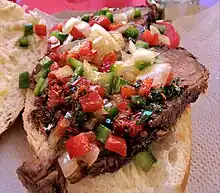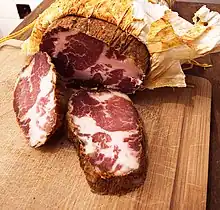Bondiola sandwich
Bondiola sandwich or bondipan is a sandwich made with thick slices of pork shoulder. They are commonly sold by street food vendors and restaurants in Argentina. The meat consists of slices of roasted or cured pork shoulder and it is usually served on crispy brioche bread. It can be topped with a variety of condiments and vegetables.
 Bondiola sandwich with toppings | |
| Type | Sandwich |
|---|---|
| Course | Street food |
| Place of origin | Argentina |
| Associated cuisine | Roasted pork shoulder |
| Main ingredients | |
| Ingredients generally used | Lemon juice |
| Variations | Bacon and onions |
History
The sandwich is common in many restaurants in Buenos Aires.[1] By 2013 it rivaled the choripán (sausage) and the parrilla (grilled fresh meat) in popularity. The sandwich is also commonly referred to as a "bondipan".[2] The pork is typically grilled and the sandwich is considered street food.[3][4] It is considered to be a traditional food item: thick slices of pork are served on a crisp bun served with lemon and garlic dressing.[5]
Description
The meat consists of slices of roasted cured pork shoulder which is served on bread. The sandwich is usually served with lemon juice.[2] There are variations of the bondiola sandwich. Occasionally the bondiola meat is braised in beer, and served with cheddar cheese and caramelized onions, and served on brioche bread. It can be accompanied by coleslaw, cabbage and a mayonnaise salad.[6] Sometimes the bondiola meat is stuffed with other ingredients such as bacon and onions and served on a bun.[7]
Bondiola meat

The fatty pork shoulder meat is prepared with seasoning which includes nutmeg, salt, paprika, and pepper. The meat is then wrapped and tied for 30 to 60 days. During the process water evaporates from the meat, and fermentation of lactic acid occurs. The enzymes which are released give it flavor.[8] Bondiola can also be made using pork rear legs and meat taken from the neck muscles.[9] The process of curing the bondiola often includes curing the meat in a pig's bladder and some forms involve adding veal (bondiola di Adria) or smoking the meat (bondiola affumicata). When bacon is included in the curing process it is called Bondiola di Treviso.[10] An American equivalent of a similar cut of meat would be Boston butt.[1]
References
- "Bondiola: Bueno Aires Street Food". Vamospanish. Vamos Spanish Academy. 14 January 2020. Archived from the original on 16 February 2023. Retrieved 16 February 2023.
- Taylor Sen, Colleen (2013). Street food around the world : an encyclopedia of food and culture. Santa Barbara, California: ABC-CLIO. p. 22. ISBN 9781598849554. Archived from the original on 3 March 2023. Retrieved 16 February 2023.
- Mills, Nicholas (2017). Moon Buenos Aires. New York: Avalon Publishing. ISBN 9781631212864. Archived from the original on 3 March 2023. Retrieved 16 February 2023.
- The best things in life are free : the ultimate money-saving travel guide. Carlton, Victoria, Australia: Lonely Planet Global Limited. 2016. p. 277. ISBN 9781760341855. Archived from the original on 3 March 2023. Retrieved 16 February 2023.
- McGuardian, Eve (30 December 2021). "Argentinian Street Food In Buenos Aires & Where To Devour Them". Jetset Times. Retrieved 16 February 2023.
- "Beer-braised bondiola sandwich recipe". La Nacion. 3 November 2022. Archived from the original on 16 February 2023. Retrieved 16 February 2023.
- "stuffed bondiola". Elnueve. Telearte. 15 February 2023. Archived from the original on 16 February 2023. Retrieved 16 February 2023.
- Amondi, Herine (5 February 2020). "Top 10 Street Food You Must Try In Buenos Aires, Argentina". Trip 101. Archived from the original on 7 July 2022. Retrieved 16 February 2023.
- Toldrá, Fidel (2007). Handbook of fermented meat and poultry (1st ed.). Ames, Iowa: Blackwell Publishing. p. 390. ISBN 9780470376348. Archived from the original on 3 March 2023. Retrieved 21 February 2023.
- Allen, Gary (2015). Sausage : a global history. London, UK: Reaktion Books. p. 133. ISBN 9781780235554. Archived from the original on 3 March 2023. Retrieved 16 February 2023.
